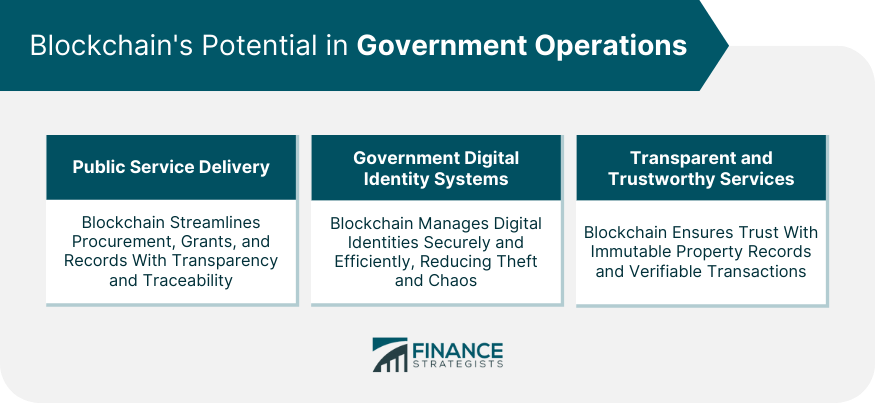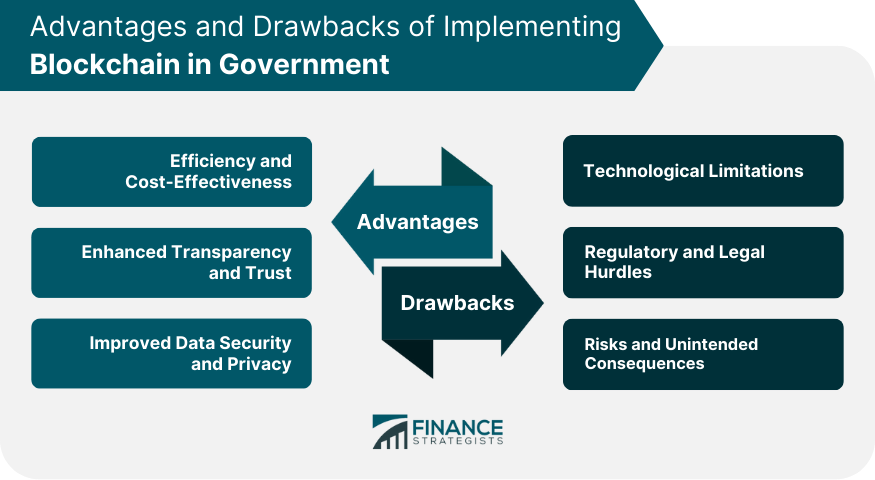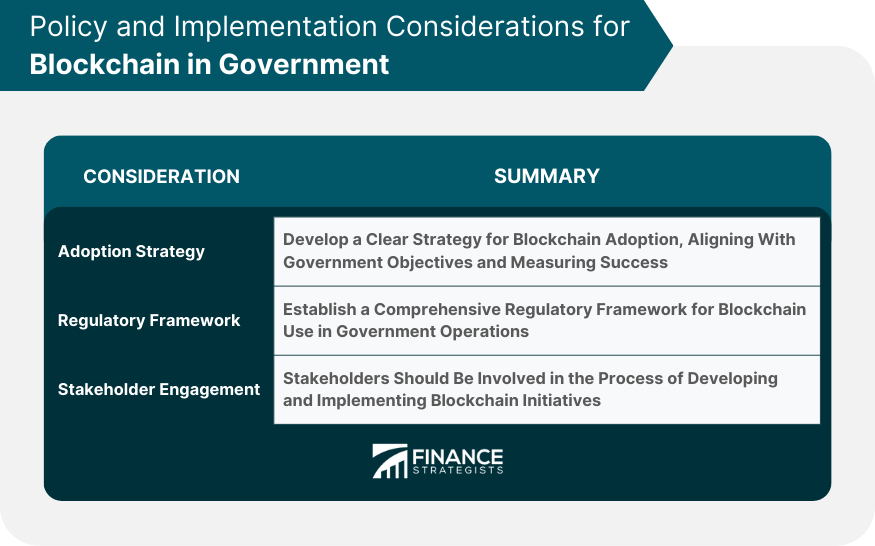Blockchain is a decentralized ledger technology that maintains a record of transactions across multiple computers linked in a peer-to-peer network. This technology has been adopted across many sectors, including government, due to its ability to promote transparency, increase efficiency, and ensure security. When integrated into government operations, it forms what we call "blockchain in government." This is the strategic use of blockchain technology to transform and streamline governmental processes and services. The primary purpose of employing blockchain in government is to enhance transparency, reduce fraud, and improve efficiency in government operations. Blockchain technology helps ensure data integrity, as the information once recorded in the blockchain cannot be altered retroactively without the alteration of all subsequent blocks, making it a robust safeguard against fraud and corruption. The transparent and immutable nature of blockchain can help build trust between the government and citizens. Blockchain in government operates on the same principles as any blockchain application. It is a distributed ledger system where all transactions are verified by network participants known as nodes. Each transaction is bundled into a block, and this block is appended to a chain of previously validated transactions. In the context of government, these transactions could be anything from the disbursement of funds, land registries, and voting systems to the issuance of digital identities. Implementing blockchain in government services involves several steps. The first is the identification of areas where blockchain could add value. Then, a detailed feasibility study and risk analysis must be conducted to understand the implications of adopting blockchain. Once the decision is made, a blockchain solution is designed to meet the specific needs of the service in question. Then, the system is tested before it is rolled out. Blockchain could play a significant role in enhancing public service delivery. For instance, it can streamline processes in public procurement, reduce bureaucracy in grant distribution, and improve efficiency in public record management. All these are achieved through the transparency, traceability, and immutability features of blockchain. Digital identity systems is another area where blockchain has immense potential. A blockchain-based identity system could provide a secure and efficient way to manage digital identities, eliminating the need for multiple usernames and passwords and reducing the risk of identity theft. With blockchain's immutable record-keeping, it can contribute significantly to transparent and trustworthy government services. For instance, in property registration, blockchain can provide a transparent and immutable record of property rights, reducing disputes and fraud. It can also enhance trust in government transactions by providing a transparent record that can be verified by any party involved. The decentralized nature of blockchain reduces the need for intermediaries in government transactions, leading to greater efficiency and cost savings. Additionally, it automates many processes that are currently manual, further increasing efficiency. As blockchain records are transparent and immutable, it can enhance the transparency of government operations and build trust between government and citizens. Blockchain's cryptographic security features ensure the security of data against tampering and unauthorized access. Furthermore, by enabling individuals to have control over their personal data, blockchain can improve privacy. Like any technology, blockchain has its limitations. The most significant of these is the problem of scalability, as blockchain networks tend to slow down as the volume of transactions increases. Additionally, there are concerns about the energy consumption of blockchain networks, especially those that use proof-of-work consensus mechanisms. Regulatory and legal hurdles pose significant challenges to the adoption of blockchain in government. These include issues around data protection regulations, legal recognition of blockchain transactions, and the lack of a legal framework to govern blockchain operations. Implementing blockchain in government also comes with risks and potential unintended consequences. For instance, while blockchain promotes transparency, it could also potentially expose sensitive data if not properly implemented. Furthermore, while blockchain records are immutable, this could be a disadvantage in situations where data needs to be corrected or deleted. For the successful adoption of blockchain in government, a clear strategy that aligns with the overall objectives of the government should be developed. This strategy should identify the areas where blockchain could add value, outline a plan for implementation, and establish a framework for measuring the success of the blockchain initiatives. To address the legal and regulatory hurdles associated with blockchain, governments need to develop a comprehensive regulatory framework that provides clear guidelines on the use of blockchain in government operations. Stakeholder engagement and public awareness are crucial for the successful adoption of blockchain in government. Governments should involve all stakeholders in the process of developing and implementing blockchain initiatives and invest in public awareness campaigns to educate the public about the benefits and implications of blockchain in government operations. As a transformative technology, blockchain offers remarkable potential for enhancing government operations. Its core characteristics of transparency, immutability, and security make it an ideal tool for increasing public trust and streamlining service delivery. Significant advantages include improved efficiency, cost-effectiveness, and data security. However, successful implementation is not without challenges. Technological limitations, regulatory hurdles, and potential risks must be carefully managed. The process requires careful planning, robust regulatory frameworks, and substantial stakeholder engagement. As blockchain technology continues to evolve, it is crucial for government entities to stay informed and prepared, ensuring they harness this technology's capabilities for the public good. The implementation of blockchain in government operations is not just about technological change; it is about paving the way for more efficient, transparent, and reliable public services.What Is Blockchain in Government?
How Blockchain in Government Works
Technology Behind Blockchain in Government
Steps in Implementing Blockchain in Government Services
Blockchain's Potential in Government Operations
Role in Enhancing Public Service Delivery
Blockchain in Government Digital Identity Systems
Contribution to Transparent and Trustworthy Government Services

Advantages of Blockchain in Government
Efficiency and Cost-Effectiveness
Enhanced Transparency and Trust
Improved Data Security and Privacy
Drawbacks and Challenges of Implementing Blockchain in Government
Technological Limitations
Regulatory and Legal Hurdles
Risks and Unintended Consequences

Policy and Implementation Considerations for Blockchain in Government
Blockchain Adoption Strategy
Regulatory Framework Development
Stakeholder Engagement and Public Awareness

Final Thoughts
Blockchain in Government FAQs
Blockchain in government refers to the use of blockchain technology to improve transparency, efficiency, and security in government operations. This could include a range of applications, from public service delivery to digital identity systems.
Blockchain can streamline processes in public procurement, reduce bureaucracy in grant distribution, and improve efficiency in public record management. This is achieved through the transparency, traceability, and immutability features of blockchain technology.
Key advantages include increased efficiency and cost-effectiveness, enhanced transparency and trust between the government and citizens, and improved data security and privacy.
Challenges include technological limitations such as scalability and energy consumption, regulatory and legal hurdles related to data protection and legal recognition, and risks such as potential exposure of sensitive data.
Key considerations include a well-defined blockchain adoption strategy, the development of a comprehensive regulatory framework to address legal and regulatory issues, and substantial engagement of stakeholders and public awareness campaigns to foster understanding and acceptance of blockchain technology.
True Tamplin is a published author, public speaker, CEO of UpDigital, and founder of Finance Strategists.
True is a Certified Educator in Personal Finance (CEPF®), author of The Handy Financial Ratios Guide, a member of the Society for Advancing Business Editing and Writing, contributes to his financial education site, Finance Strategists, and has spoken to various financial communities such as the CFA Institute, as well as university students like his Alma mater, Biola University, where he received a bachelor of science in business and data analytics.
To learn more about True, visit his personal website or view his author profiles on Amazon, Nasdaq and Forbes.















